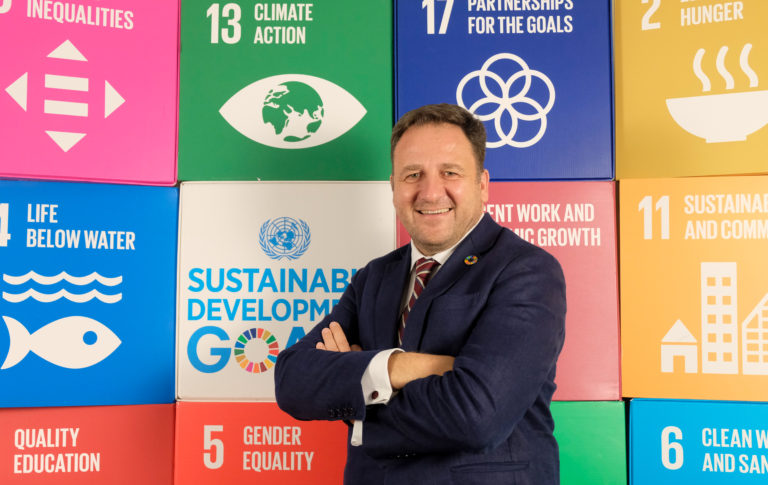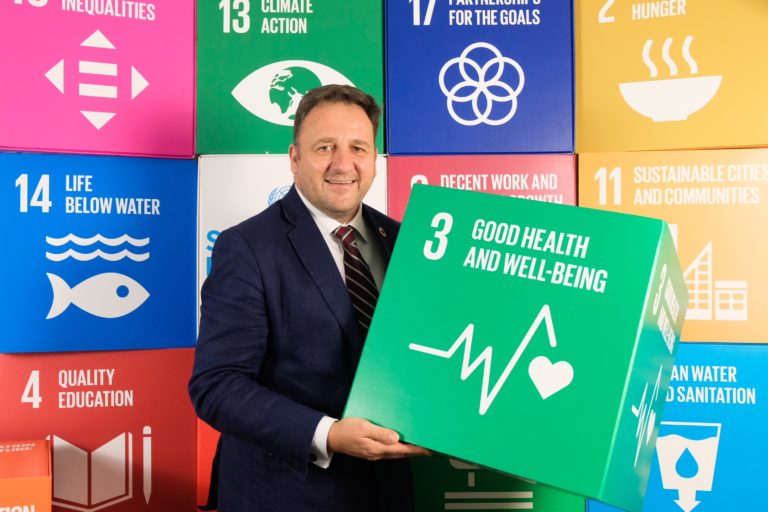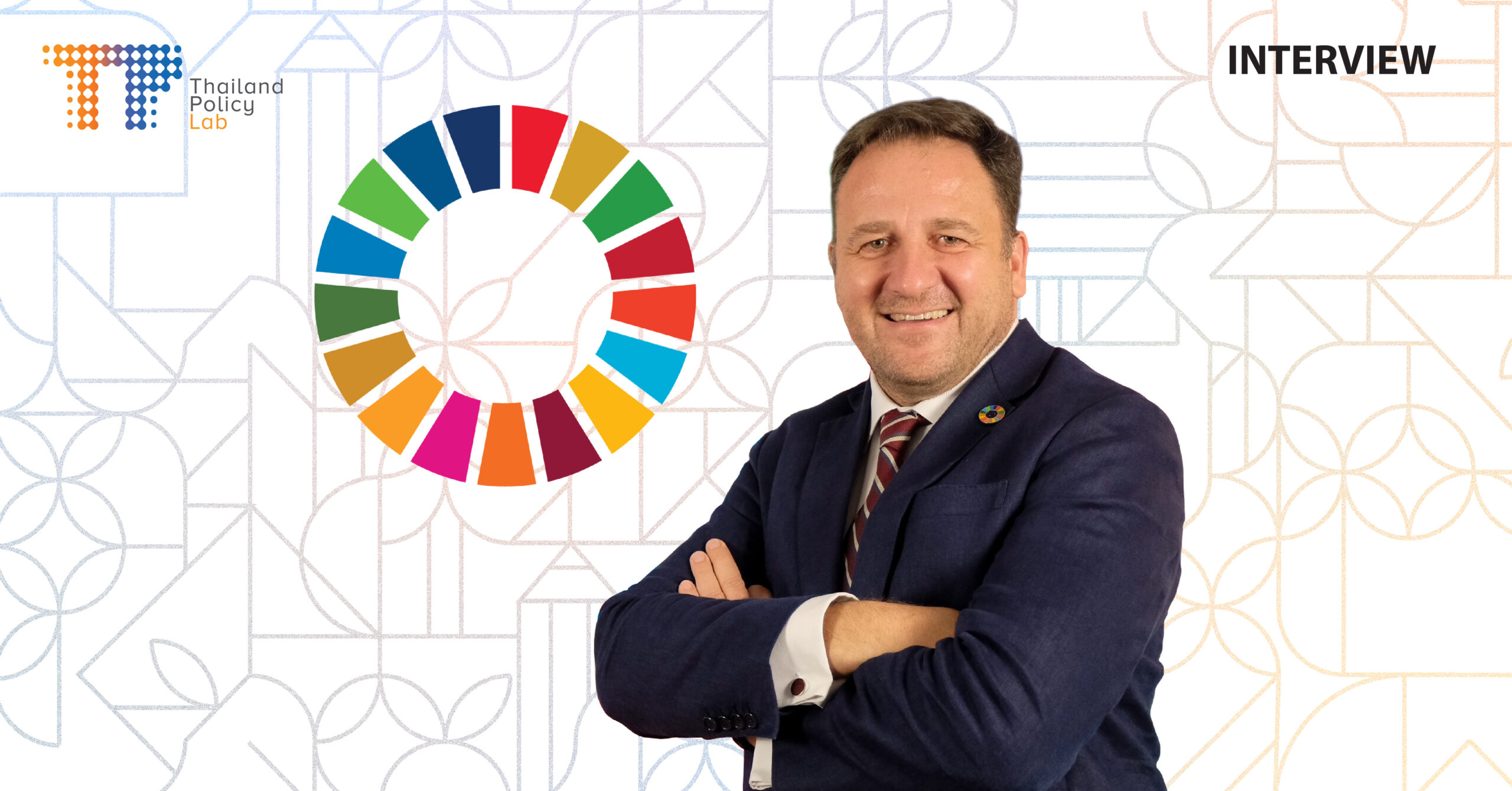To say that now is the most challenging time for policymakers in Thailand is not an overstatement. The world is facing a period of drastic changes further complicated by the covid-19 pandemic in the past two years. This situation drives Thai policymakers to seek alternatives to the conventional policy process—top-down, non-participatory, lacking innovation—as it likely falls behind at the global level and fails to respond to the need of people.
United Nations Development Programme or UNDP is one of the leading international organisations with expertise and experience in public policy. For a long time, UNDP has been supporting development progress in Thailand to achieve the 17 Sustainable Development Goals (SDGs). As Thailand faces the multiple challenges that result from the global period of changes, UNDP aims to push Thailand towards transformation and elevate its public policy so that it is ready to face new challenges.
101, Thai online media, talked with Renaud Meyer, Resident Representative of UNDP in Thailand, on the country’s public policy and its processes, which are in time for transformation. We discussed Thailand Policy Lab initiative, a collaboration between UNDP and the Office of the National Economic and Social Development Council (NESDC) that aspires to transform Thailand’s public policy processes into ones that respond to global changes.

The world has gone through radical changes in the past decade. Thailand is facing many challenges. Which issue do you think is the most pressing one for Thailand?
There are several, actually, but the obvious ones revolve around the spread of covid-19. It is clear now that the pandemic not only concerns health, but it also urges us to rethink our way of living and reconsider many issues that are usually neglected.
Most importantly, it brings out the relationship we have with nature. Humans commonly think nature is here to serve us when in reality, it is us humans who must serve nature. The world exists long before us, and we are but guests who reside on it. We are the ones who must learn to coexist with nature. This idea that human reigns supreme and nature must serve us has brought so many problems, including ecosystem degradation, faunas going into extinction, or climate change. All these are coming around to our detriment.
Apart from our relationship with nature, connections between humans need to be reconsidered as well. Can we stand to see some people living in extreme poverty while some amassing extreme wealth, despite living next to each other? Inequality, therefore, is a pressing issue that we all need to find a solution to together. Democracy and freedom are also important. How do we ensure that regulations are effective and enforceable while citizens still retain their freedom of expression?
We also must think of economic development and wealth creation in a sustainable manner. When it comes to Thailand, we think of the tourism industry. If we focus only on the quantity, try to herd as many tourists as possible, and let them do anything they want, I guarantee you that in 10 years, Thailand will have nothing left. So we must reconsider the balance between quantity and quality. Of course, we want tourists to come, but we must think of ways to protect the environment as well.
Other industries as well. Thai economy, in general, must lean towards a green economy, such as seeking to reduce carbon emissions in economic activities. Also important is adjusting people’s ideas. I remember when Thailand put out a ban on plastic bags two years ago. At first, the policy was met with resistance, and people complained that they did not want to pay for plastic bags. Today, we can see that Thai people have become used to this policy. I am impressed that many Thais turn down plastic bags entirely. This shows that we can influence the thoughts and behaviours of the people to serve nature. Do not worry that people will resist; at one point, people can adjust and accept changes when they understand the true objectives.
You raise many issues that Thailand needs to find solutions to. In doing that, public policy plays a crucial role. What is your view on Thailand’s public policy? Can the existing process respond to those challenges? Is there any aspect that needs to be adjusted?
One legacy that persisted through the history of Thailand is the concept of centralisation, generally held by old power. As a result, most decision-making belongs to the central government. I think Thailand should look more into decentralisation and engage local communities in creating policy. We must remember that each region faces different problems. Even if it shares a problem, details can vary.
Most Thai people today want to see their country leapfrogging. They want developments that truly benefit the people, developments that are a result of their participations and not merely a direction given by the authority. This phenomenon is not unique to Thailand; rather, it is occurring in several countries worldwide.
Another point we must be aware of is that the world has changed. The course of development of today, of course, cannot follow the same old path. Holding on to the old ways cannot bring about positive results. Not only will the country be unable to move forward, but we will also be left behind since other countries refuse to be frozen in time. That, in turn, will create discontent among people, which plays out recently as conflicts between generations.
The government’s role is much more complex than before due to the speed that the world is progressing. At the same time, demands from the people grow increasingly diverse and challenging. If the government fails to respond, or if the people do not have faith in the government’s capability, civil discontent will build up.
Recently, UNDP has inaugurated Thailand Policy Lab, a collaboration with NESDC. Could you tell us about it? How did it start? Could it offer a solution to public policy design in Thailand?
UNDP and NESDC share the same vision, that Thailand is facing challenges that are more complex, more integrated, and more multidimensional, similar to many other developing countries. The conventional policy process—top-down, non-participatory, lacking innovation—can no longer solve problems or help countries achieve their goals. Moreover, citizens of this day have greater visions thanks to education and exposure to the world. They want to participate in policy formulation and refuse to stay on the sideline.
With these two concurrent phenomena, we need a new approach to address the issues, and this approach must open for citizen engagement. UNDP and NESDC, which have been collaborating on development in Thailand for a long time, agreed to co-found Thailand Policy Lab as an answer. We attempt to apply an integrated approach to complex issues. We try to find solutions by way of new processes. More importantly, we use an approach to policy design that includes the usually overlooked voices of the people.
It appears that the core idea is to engage people in the policy design process. How important is this? How can it transform Thailand’s public policy?
We aim to make more democratic the public policy design process by providing a platform that people can voice their views. We use the concept of co-design, participation, collective bargaining and negotiation, and conversation in our policy design process. We try to invite people to participate, regardless of their income, status, or career. We believe that everyone has something to exchange, not only experts.
A good example of this is climate change. People commonly think that scientists are the only qualified speakers on this topic, while in reality, anyone can have a say on it. You do not need higher education to perceive the signs and impacts of climate change. You could notice the rising water level of a river near the neighbourhood, or ethnic groups living in the forest could notice that some wild animals are disappearing. Anyone can join the conversation about it, not just academics.
We have to abandon this kind of idea, that some people know while others do not, or that some people are helpful and others are not. Everyone has their purpose. I went to Nepal right after the devastating earthquake that destroyed houses. Our mission was to plan a recovery and reconstruction of the houses. At one point, it dawned on us that all people coming to this project were all men. Planners, architects, engineers, all men. No women were involved, although they usually spend more time at home than men, and understand each part of the house and their functions better. They know where the kitchen, bathroom, living room should be located, and how the piping system works. Once we engaged with women, we learned several aspects that we had never come across before. So the results were much better than expected.

What is UNDP’s role in Thailand Policy Lab?
UNDP is an international organisation with offices in over 130 countries. While each country faces its unique challenges, some might share similarities or are transferable. An international organisation like us can exchange experiences between offices. For instance, when Thailand encounters a challenge that other countries have had, I can reach out to offices in those countries and learn about their success or failed solutions. We also have access to the worldwide networks of universities and research institutions, so UNDP can support Thailand Policy Lab in connecting with data resources. At the same time, UNDP can bring experiences or success in Thailand to share with other countries; the world will also benefit from Thailand Policy Lab.
I should make a point clear, which is, UNDP is not going to command every step Thailand Policy Lab takes. We are not going to instruct which issue the Lab must work on. Thailand Policy Lab works independently and designs its own operation. UNDP provides support on the approach and process. How to apply it is up to Thailand Policy Lab.
What future do you see for Thailand Policy Lab? Apart from providing a platform for citizen engagement, how can Thailand Policy Lab elevate Thailand’s public policy?
We set a rather ambitious goal, but achievable. In the long term, we want Thailand Policy Lab to become a resource and model to ASEAN. Member countries will be able to learn and adopt Thailand’s solutions. As ASEAN nations face similar challenges, such as the threat of sinking capitals resulting from climate change, wouldn’t it be better if we collaborate and exchange ideas? This is our long-term goal.
In the shorter term, we want to upgrade Thailand’s public policy. As a think tank under a government agency, Thailand Policy Lab can bring together state agencies responsible for different issues. It will prompt more integration among Thai government agencies, which will lead to a better public policy, both policy itself and process.
It looks like there is an intention to inspire changes in the Thai bureaucracy. How are you going to achieve that?
We want to help the Thai bureaucracy break the cycle of traditional, habituated work. This is a major challenge for us, because it is a battle against conservatism. Convincing people to change, or to try challenging things, is not easy, even if we assure them that the result could be rewarding. We can invite them to join trainings or events, but if they come with a closed mind, we cannot get to them.
First, we want to encourage a more collaborative work style, bringing people or organisations to collaborate. Some private companies in Thailand have created Innovation Hubs, which are fantastic for state agencies to connect. Such state-private partnerships could lead to creation of something that will benefit both parties. So this is what Thailand Policy Lab is considering in this beginning phase. I hope it will become a model for the new work style in Thai bureaucracy system.
Another thing we want to do is to encourage a work style where people do not stop posing questions. When work becomes habitual, people tend to stop asking questions to themselves. Politicians might believe they know everything when actually there are many more that never cross their minds. For instance, right to education. Many forget that Thailand has stateless students, whose statelessness prevents them from receiving a scholarship or enjoying rights like other children. Those people might have never thought about it. Questioning is in the work culture at Thailand Policy Lab, so we want to encourage this change. We will urge people to pose more questions so that different ideas will grow. We must shake down the whole system.
That is a challenging goal. Transforming the entire bureaucracy and conservatism is not a small task. Do you have any hope to overcome this challenge?
If I didn’t have hope, I would not be talking to you here (laugh). I would have packed my bag and gone home. Of course, I am full of hope. Everyone who works in development has to be hopeful, otherwise, we would not take action.
What makes you hopeful?
There are factors as to why we cannot resist changes. First, a demographic shift in population structure. Younger Thais today are questioning the older generations and are skeptical toward legacies left to them. It does not mean that they are not proud of their national history, but today’s youths are aware of their ‘global citizenship.’ They see people their age elsewhere living a good quality of life and enjoying benefits from the states. So they want those too, calling for the authority to try similar strategies of successful countries. This is why we see the young generation of Thais on the street, calling for changes and condemning issues around them. This is the truth as to why we cannot evade changes.
Another issue is efficiency. As I already mentioned, the challenges we are facing today are much more complex than before. It is imperative that we find a new approach that is efficient and worth the investment. Before coming to Thailand, I was in a country that is quite behind on development. They had a fiber optic project that connects with neighbouring countries, which would provide broader access to the internet to the people. It was ridiculous that a day after they buried the fiber optic, the water supply agency said they needed larger pipes. So they had to dig the same hole several times, when they could have done everything by digging only once, which would have lessened the cost. That is why we must consider efficiency.
To put it bluntly, old formulas cannot tackle those new problems anymore. It is time for new ideas and actions.

